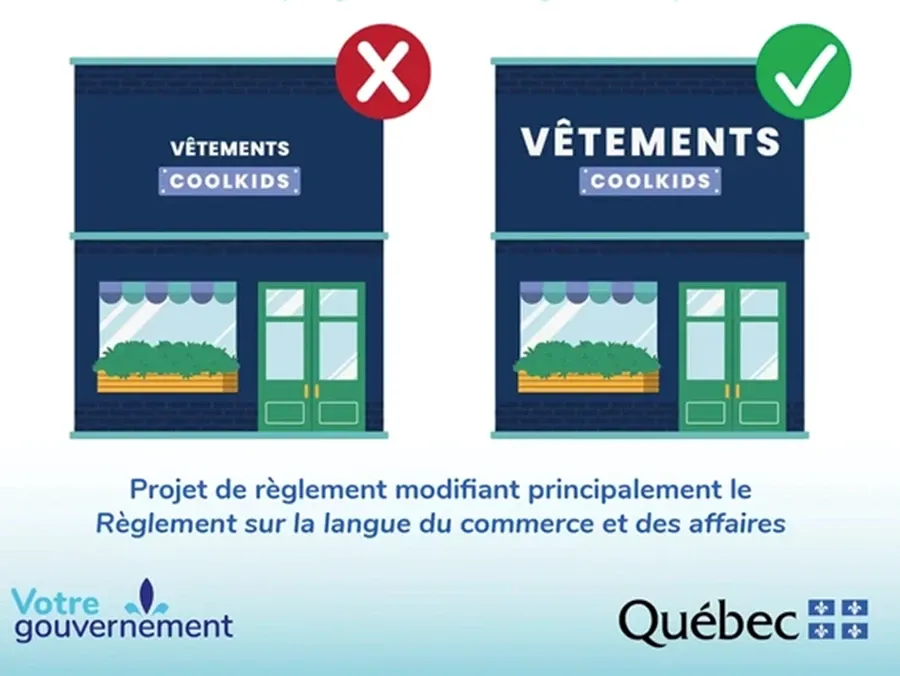Table of Contents
Patrick Carroll
Patrick Carroll is the Managing Editor at the Foundation for Economic Education.
The government of Quebec issued a series of draft regulations on January 10 that target the outdoor commercial signs of businesses in the province. The proposed rules would require companies to operate under a “French first and predominant” policy with respect to their signage.
The Minister of the French Language, Jean-François Roberge, is the chief proponent of this policy.
“What Roberge is targeting are outdoor commercial signs – particularly those that include such trademark names as Canadian Tire or Second Cup,” Philip Authier explains for the Montreal Gazette.
The current law says such non-French trademarks are allowed as long as they are accompanied by a generic term or other description of the products or services offered. Not all companies have respected that rule, which was created in 2016.
The new regulations will abolish that old rule, replacing the term “sufficient presence of French” with the “markedly predominant” presence of French. The regulations state the French text must “have a greater visual impact” than any other language on the sign.
The reason for these regulations is the same reason that there is a “Minister of the French Language” in Quebec: Quebecers are struggling mightily to avoid losing their distinct culture, and especially their language.
Many other regulations in recent years have had similar purposes, leading to no shortage of controversy. Other targets of “more French” laws have included post-secondary education, bilingual municipalities, and government services.
The preoccupation with the French language may seem a bit bizarre to those unfamiliar with Quebec’s unique cultural history. But make no mistake, this is something many Quebecers are quite passionate about. Roberge’s comments on the new signage regulations provide an eye-opening summary of the views of many Quebecers.
“What’s important is that we have what I call a francophone environment or a francophone visage when I walk in the streets of Montreal, Laval, Saguenay, St-Hyacinthe or Drummondville,” Roberge said. “We are not living in Boston, Atlanta or Los Angeles, and it has to show (visually). It doesn’t bother me to see words in a language other than French. What bothers me is when it is omnipresent. It bothers me when I walk in front of a store and a person has to be able to speak several languages to understand what this store is about.”
“We’re going back to the global visual impact concept,” he continued. “When you look (at a business) overall, globally, is French markedly predominant? Does (French) occupy two-thirds of the space?”
Mandated Waste
There are a couple of problems with this move. For one, the initiative displays a concerning disregard for economic tradeoffs.
The Quebec government estimates it will cost companies around $7–15 million to comply with the new regulations, but many are saying it will cost much more than that. The costs are “grossly underestimated,” said Alexandre Fallon, a lawyer who specializes in Quebec’s French language laws.
Even the US government has taken notice. According to a January 24 press release from the Office of the United States Trade Representative, Senior Advisor Cara Morrow recently had a diplomatic meeting with Canada’s Deputy Minister for International Trade, wherein she “shared concerns about trademark provisions of Quebec’s Bill 96 [the law in question] and their potential implications for US businesses, including small and medium-sized enterprises.”
Roberge is aware of the economic concerns, but leniency doesn’t seem to be on his agenda. “The nuance is these French elements will have to be permanent,” he said. “You can’t just tape up a piece of cardboard. They have to be visible and readable.”
One wonders whether Roberge and his supporters have fully considered the cost of such a policy. True, these rules will hurt businesses. But the more important cost is that scarce resources will be diverted away from initiatives that benefit consumers more and toward wasteful signage changes that are clearly not in much demand on the market.
To put it candidly, more resources going to French signage means fewer resources going to things like housing, healthcare, and education. Even if one thinks preserving a francophone culture is important, is it really worth wasting all these resources at a time when other needs are clearly far more pressing?
Your Business, Our Choice
The other problem has to do with the broader political philosophy behind these rules and similar French-language laws.
Roberge says he is “bothered” by the lack of French signage in Quebec, and I don’t doubt this is true. But my question for M Roberge is simply this: why should your being “bothered” about a dearth of French signs entitle you to force people to put them up?
I am bothered by a great many things in the world. The facade of many businesses bothers me, because the architecture or color scheme doesn’t suit my tastes. I am bothered by how people keep their gardens and by how they dress. I am bothered that stores are not open at certain hours that are convenient for me.
But while these things all bother me, and some very much so, I would never dream of coercing others to change how they conduct their affairs, just to suit my personal preferences. That would be the height of presumption.
True, compelling a change through a government mandate is a more formal process of coercion than a lone citizen brandishing a gun. But force is force no matter how it’s dressed up. And I would simply submit that, no matter how it is effected, forcing your neighbors to conduct their affairs according to your preferences should be considered disrespectful, audacious, and, quite frankly, tyrannical.
“Surely, it’s not tyrannical!” you might object. “This is a democratically elected government. It is a popular policy.”
It is certainly true that many Quebecers agree with this policy. But popularity hardly transforms an immoral act into a moral one.
Herbert Spencer called out this bogus defense in his incisive 1851 essay The Right to Ignore the State:
The rule of the many by the few we call tyranny; the rule of the few by the many is tyranny also, only of a less intense kind. “You shall do as we will, and not as you will,” is in either case the declaration; and if the hundred make it to the ninety-nine, instead of the ninety-nine to the hundred, it is only a fraction less immoral. Of two such parties, whichever fulfills this declaration necessarily breaks the law of equal freedom: the only difference being that by the one it is broken in the persons of ninety-nine, whilst by the other it is broken in the persons of a hundred. And the merit of the democratic form of government consists solely in this, that it trespasses against the smallest number.
Perhaps being lectured by Herbert Spencer, an Englishman, is not amenable to you, M Roberge? Very well. As a courtesy, out of my free choice to use the language I see fit, I give you the same principle, but from a Frenchman, Denis Diderot, and in the French language.
“Aucun homme n’a recu de la nature le droit de commander aux autres.”
“No man has received from nature the right to give orders to others.”
Additional Reading:
The Right to Ignore the State by Herbert Spencer
Why America’s Founders Didn’t Want a Democracy by Gary M Galles
This article was originally published on FEE.org. Read the original article.







